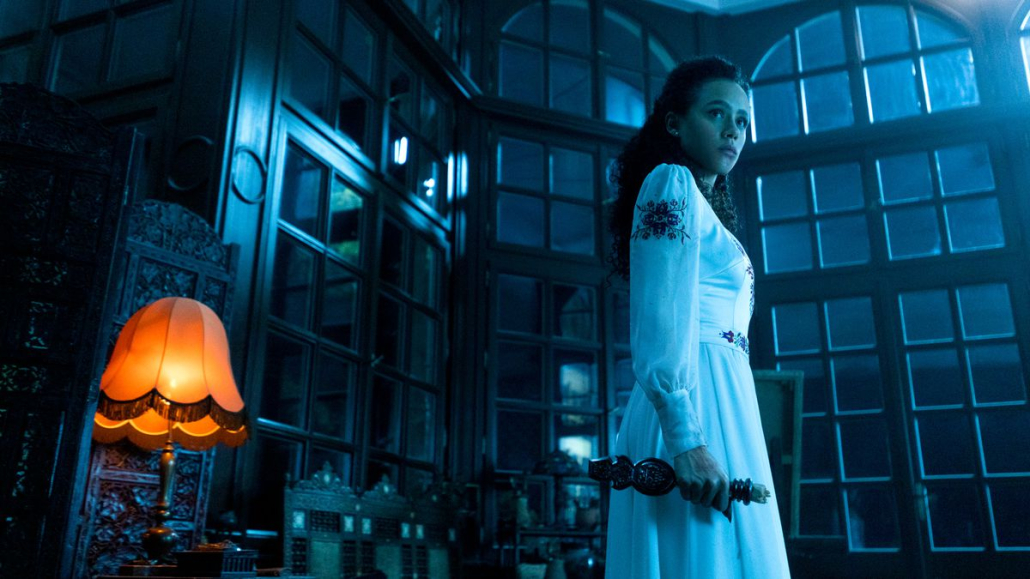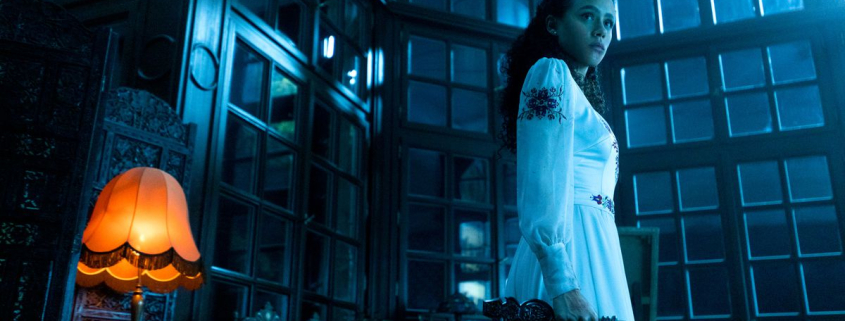‘The Invitation’ bloody, not quite brilliant
This review contains spoilers.
As the saying goes, blood might be thicker than water, but when blood is the drink of choice for one’s family, “blood ties” become a lot more terrifying. Fundamentally altering one’s perceptions of liquids, “The Invitation” delivers a self-discovery drama in the envelope of a vampire horror film. Although the envelope (read: plot) is a bit difficult to decipher, the “letter” inside does offer some more meaning.

Directed by Jessica M. Thompson, “The Invitation” stars Nathalie Emmanuel as Evie, a lonely woman and ceramist living in New York City who discovers that she has a long-lost cousin in England named Oliver L. Alexander III (Hugh Skinner), or, as Evie’s best friend (Courtney Taylor) says, the “whitest man” she’s “ever seen.”
Upon meeting, Oliver invites Evie to a family gathering for a wedding to take place in the English countryside. Evie reluctantly agrees, and once she arrives at the mansion, she is immediately seduced by its enigmatic “lord,” Walter DeVille (Thomas Doherty). In between her romance with Walter and “reconnecting” with her extended family, Evie reckons with the mansion’s inner horrors and soon finds that her “family” might be the real horror (they’re vampires).
The first half of the film details how the mansion isn’t what it seems after Evie arrives, pulling off a standard tension buildup between Evie and the guests, her “family.” The second half is where the mystery falls apart — a necessary climax, as Evie realizes the mansion is full of vampires — but once the shock fades away, the rest of the film becomes a disorganized mess.
First, there’s Evie’s attempt to escape, then, her confusing consumption of Walter’s power and finally, a dramatic exit from the mansion. This is all hastily wrapped up with an out-for-final-revenge ending that was seemingly tacked on at the end without the audience having the satisfaction to witness its results.
Looking at its entirety, the film could have benefited from being more self-aware. There were times when the vampire fangs and extended fingernails seemed almost like a parody of vampires and, to an extent, vampire movies. These seemingly ridiculous and exaggerated elements were implied to be serious additions to the horror genre — a presentation that didn’t quite work out given the comedic connotations of the vampire look.
With how the material was structured, “The Invitation” didn’t appear to capitalize on its variety of content effectively. The filmmakers seemingly chose to present the storyline as one rooted primarily in horror. Had the film leaned into more of its complexity and had there been some humor injected in certain moments, “The Invitation” could have been a genre-mashing creation and skillful new riff on gothic horror.
In terms of actually creating the gothic horror elements, however, “The Invitation” does a pretty remarkable job with the set design. There are some genuinely scary jump scares littered throughout the first half of the film, all embedded within the dark and mysterious atmosphere of the mansion. As the maids are asked to run errands throughout the house, the viewer follows along their journeys in the mansion’s various rooms, watching as seemingly “normal” errands transition into creepy encounters with the supernatural.
There appears to be a deeper message present in the film about what “blood ties’’ really mean, given that this is a vampire horror as well as a drama of a lonely woman seeking a family. It’s a bit hidden, but still present. It really comes to light with Emmanuel, who manages to channel a complicated vulnerability for her character in an empowering way.
It could be said that Emmanuel’s performance is truly the film’s saving grace in making Evie an empathetic character. By portraying Evie’s desire for connection with others, Emmanuel helps shed some light on why Evie continues to stay in the mansion even when she starts becoming aware of its oddities.
Another well-developed dynamic within the story is Evie being perceived as an “Other.” “The Invitation” introduces some subtle commentary on race and class inequalities into the story when Evie, a Black woman who comes from a low-income background, enters this mansion full of wealthy, white individuals who not only don’t understand her financial difficulties, but even make digs at her assumed inferiority.
On the superficial level, there’s the “Othering” of Evie as a mortal in a house of vampires. On the other hand, Evie is an “outsider” in terms of both race and class, as well as being a foreigner in an unfamiliar country. These nuances give power and intention to the film in capturing the heart of relevant — and arguably much more realistic — issues.
Given the lasting impressions of this “event,” one might not call “The Invitation” a “bloody brilliant” film. For those who seek blood, there’s quite a lot of it. As for brilliance, well, it might not be the drink of choice.

